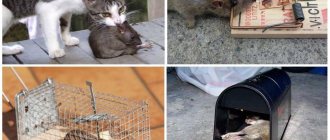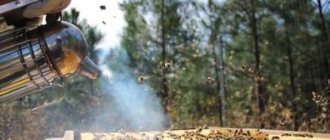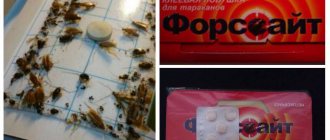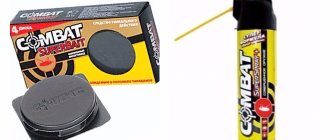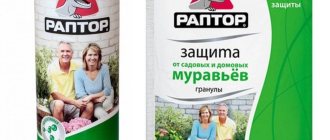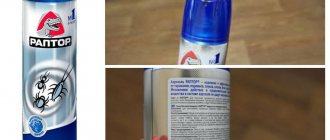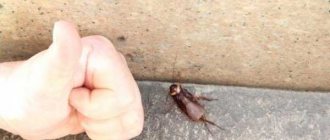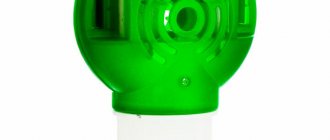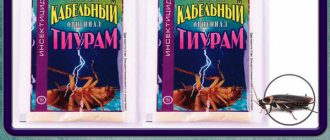In everyday life, especially for city residents, searching for an effective remedy for wasps and hornets is much less common than, for example, trying to find a remedy for cockroaches. As a rule, garden lovers and especially beekeepers have to think about how to poison hornets (several dozen hornets in just a couple of hours can completely destroy a bee colony of thousands).
Poison for wasps and hornets can also be useful when particularly “daring” insects decide to build their nest inside utility rooms or in the immediate vicinity of them. In this case, such close proximity of insects to humans can simply be dangerous to health, especially for young children.
Considering that hornet and wasp bites (even single ones) can sometimes lead to severe intoxication, and in rare cases even to death, it is advisable to destroy the nests of these insects as soon as possible, without waiting until they suddenly perceive a person as a threat and attack on him. At the same time, hornets and wasps can be killed either directly with insecticidal agents or by combining them with mechanical destruction of the nest.
When are insects most active?
Particularly attentive gardeners name the exact period of the year when insects become extremely active - this is the end of summer, August. During this period the following is observed:
- The insects have already collected supplies for the winter and are trying to protect them from beekeepers. Currently, many hive owners are trying to replace honey with sugar syrup.
- Wasps fly a lot, families that have grown over the summer noticeably increase in size, so they need a lot of food.
- Nest building ends and time begins
There are other reasons for such restless behavior of insects throughout the year. For example, this could be unfavorable climate conditions or the natural “viciousness” inherent in some breeds.
How can you scare insects away from your own area?
There are a lot of tools that will help fight insects and successfully send them away from the site. It should be taken into account that such means differ somewhat from each other due to their strong aggression. So, here are ways to repel dangerous insects:
- A building with a continuous fence. The border between the plots should be constructed as a solid fence, with a height of at least 2.5 m. Then insects will not rise to a height and will not be able to fly into the plot.
- Moving. This method involves changing the location of the hive in order to locate it further from residential buildings. Of course, it is not ideal, because the flight radius is quite large.
- Fumigation with smoke. The best option is to make a fire from pine or spruce branches. When combustion begins, substances with an odor that is unbearable for wasps will be released. This method is somewhat outdated and is almost never used today due to the fire hazard.
- Repelling with odors. Bees and wasps cannot tolerate certain odors, which serve as good protection for people. This may include vegetation that is planted on personal territory, essential oils, and household substances with a strong odor.
- Ultrasonic repeller devices. Insects hear the sound of an electronic device while a person does not react to it at all. For honey-bearing bees, it is better to use an option with an electromagnetic emitter with a softer effect, because this repeller will not be particularly harmful to insects.
- Chemical substances. This method is harsh and can lead to the death of insects.
It is best to fight wasps at the end of winter, when the swarm is not so numerous.
Poison for wasps boric acid
Video: Boric acid from ants
The use of poison in its pure form is quite rare, since the wasps need to be attracted to the substance. Boric acid does not have a pronounced aroma, which means that a wasp will not easily fall for the product. In addition, it is important to know that the concentrated solution is prepared based on alcohol. The pungent alcohol smell repels insects.
Ground wasp
Boric acid can be used as a poison in its pure form without additional equipment against earth wasps. They make their nests in holes in the soil. To destroy a hive, you need to take 1 bucket of water and dilute 0.1 kg (10 packages) of boric acid powder in it. This solution needs to be filled with the entrance and the space around it.
What smell scares bees?
Insects absolutely cannot tolerate strong odors, for example, the smell of mint, lemon balm, cloves, wormwood, and citrus fruits. The most unacceptable thing is the smell of smoke from burning polystyrene foam; they try to fly as far as possible. It must be said that such a smell is extremely unpleasant for people, and therefore cannot serve as a systematic protection. It is not recommended to burn pieces of foam plastic on the site for a long time.
Insecticides are considered especially dangerous for bees, as well as poisonous agents that can not only scare away, but also destroy. Summer residents usually use such drugs to combat wild bees.
Clean House universal aerosol
This aerosol completely disinfects any wasps in the room. In this case, the insects will be exterminated quickly. If you do not have small children or animals, you can start processing in the morning and after 18 hours the process will give results.
Advantages:
- The aerosol has a universal effect;
- The drug works quickly, destroys not only wasps, but also other flying pests;
- Does not leave stains on the surface of the treatment;
- The sprayer performs 2 tasks: simple spray and wand for difficult to penetrate areas;
- The format is one of the most voluminous - 600 ml.
Insect sprays
Aerosol packages are considered very convenient; they allow you to quickly treat the area, while at the same time, the potent filler neutralizes insects. There are several types of such funds.
Repellent spray “Clean House”
The action is based on the presence of insecticidal elements - tetramerin and cypermerin, which penetrate the body of insects, disrupting the functioning of the nervous system, causing paralysis. They work most effectively indoors; the can must be shaken before use. It is worth starting spraying at a far distance from the front door, then gradually approaching the exit.
During the treatment process, you need to close the windows and doors, when everything is over, ventilate the room for half an hour.
Repellent spray "Bros"
Thanks to the unique configuration of the nozzle, the Polish drug can be sprayed from a distance of 5 m. This is a highly toxic substance for wasps, but is absolutely safe for people. Before use, be sure to shake the container; it is recommended to use it when the insects are in the nest. The drug is sprayed towards the nest, held vertically. After a week, you can spray again.
Delicia repellent spray
The product is made in Germany and includes repellents and insecticides that provide quick and effective destruction of wild insects. The protection lasts for five weeks, a stream of the substance should be directed to the places where wasps gather, then the area should be left for fifteen minutes. After using the drug, no stains remain, should not be sprayed near fire or heating devices, and should be stored in a dark room. Contact with animals and humans is prohibited.
Mosquitoll
The advantages of the drug lie in the combination of pesticides - cypermethrin and bioallertin; when using it, protective equipment is required; spraying should be carried out while maintaining a distance of 6 m.
Dichlorvos
When using, shake the can; it won't have a good effect outdoors. Therefore, you should put a plastic bag on the nest, make a hole in it, and spray a substance that has a paralytic effect for two hours.
Some gardeners choose karbofos, which is similar to the previous option, but its pungent odor prevents it from being used indoors. It works very quickly.
Argus (Argus) universal aerosol
The universal remedy Argus is necessary to protect against stinging insects, including wasps. Carefully treat clothing, curtains, and textiles. Usage: Place clothes where there is a draft. The product must be held at arm's length and the stream directed towards the wind. Treat your pants in all places where insects can enter. Dry the fabric for several hours and put it on your underwear. Repeated treatment is possible after 15 days, or after washing. Treatment on humans is not recommended.
Using our services, you can buy any drug at an affordable price, and are guaranteed to receive protection for your home.
Insect repellent plants
This method is gentle and environmentally friendly, based on the deterrent effect of the odors of grass, which insects do not like. An unusual, possibly pungent odor will force you to avoid such areas.
- Mint. Includes menthol, which is not tolerated by bees, which is why they avoid areas with the plant.
- Melissa. A pungent odor, the only condition is one thing: the plant does not develop in the shade, therefore it can only protect sunny areas.
- Lavender. It has a pleasant but very persistent aroma. The combination of essential oil elements encourages insects to fly away.
- Sagebrush. Able to drive away, in addition to wasps and bees, other annoying pests. The extremely persistent odor has a negative effect on the organs of insects.
- Basil. Bees do not like the smell of spices, because they have a strong aroma and cause complete rejection.
- Geranium. It has a specific persistent odor.
Ultrasonic waves
Insects are very sensitive to the action of ultrasonic waves, for this reason beekeepers and gardeners use this type of repeller, especially when fighting wild bees. According to reviews, it is most effective indoors, but in open spaces you need the most powerful devices.
- Portable version, operates on batteries, has a mode switch. It has a special metal clip to attach it to your belt, and also a cord to hold it around your neck. It is convenient for use both indoors and outdoors.
- Weitech WK-0432. This is a kind of imitation of a wasp nest. They are afraid to fly close so as not to find themselves under the aggression of their brothers. Effective within a radius of 5 m, non-toxic.
- OK-4. Designed to look like a keychain, it is convenient because you can wear it on you all the time. Mosquitoes also try to avoid it.
- X-BIRD. Standard version of the repeller with high power. It also works against rodents and can be used indoors and outdoors. It has from five to seven modes depending on the type of model. Operates within a radius of 700 square meters. m.
- A universal repeller, absolutely harmless to people and electronics. It can be used in public institutions, also in apartments with an area of 200 square meters. m.
Where do hornets live
In general, places for the settlement of such insects should be dry, light and warm . They are also afraid of drafts, so places should not be blown by winds. However, insects historically use this method to make their homes in the wild and in places that are in no way connected with human agricultural lands or their settlements.
Therefore, they also make their homes in forests, forest plantations, groves, and parks on tree hollows . Eastern individuals like to settle even in deserts, steppes, semi-deserts in dry ravines and ravines.
Traditional methods of repelling insects
The simplest and most common methods of control today are traps, which are often made from plastic bottles or glass vessels. It is necessary to pour water, then add an element that can attract insects - meat, sugar, fish. It is important to ensure that individuals caught in the trap do not have the opportunity to get out, and then they must be destroyed. This option will not completely get rid of insects, so gardeners also use water or a plastic bag. It must be borne in mind that actions are usually carried out when the inhabitants of the nest have completed flying around the territory.
Another method is to place soap or hot pepper near the nest.
It is necessary to practice every possible method to improve efficiency.
Prevention
Reproduction of wasps can be prevented by following preventive measures:
- Empty hives must be destroyed and the attachment site must be disinfected with potassium permanganate or peroxide. Wasps very often occupy old houses;
- Conduct an audit of fruit stocks, remove rotting specimens;
- Inspect the cracks in the wall, ceiling, floor, and, if possible, seal them with sealant and other building mixtures;
- Carry out preventive insecticidal treatment before moving into the house;
- Carry out general cleaning;
- Periodically rearrange things and furniture; wasps love secluded corners where no one looks in or disturbs them.
Boric acid greatly simplifies the fight against wasp nests in a summer cottage. In some cases of mass colonization of wasps, after treatment with boric acid, additional treatment is carried out with more aggressive chemicals.
Traps containing insecticides
It is permissible to “stuff” traps, in addition to edible baits, with poisonous agents. Boric acid is very popular as a bait; it will not repel insects because there is no smell, for this reason it is considered a very valuable bait.
Insecticides are also added to the traps:
- Avant, KS. The substance is toxic to the queen bee, which dies when her fellow bees carry it on their own legs.
- Used in the fight against wasps.
- Medilis-Ziper. Easily and quickly dissolves in water; the product is poured into traps or used to treat insects.
Gardeners also use any kind of insecticides or purchase Velcro with glue.
Precautionary measures
The destruction of stinging insects is always associated with danger. Even the fastest-acting remedy does not kill all wasps at once. They can leave your home and inflict many painful bites. To protect yourself, you should take precautions:
- First of all, you need to make sure that you are not allergic to wasp and hornet venom.
- It is better to start processing the nest in the evening, when its inhabitants are least active.
- Do not use light sources (flashlight).
- Do not wear perfume before work.
- Provide options for quick escape into the building.
- Use protective equipment: long sleeves, gloves, hat, mosquito net for face.
Attention. Social insects, in case of danger, give a special signal to their relatives, according to which they flock and attack in a swarm.
What can scare bees away from humans?
There are odors that strongly irritate or attract insects, while some simply repel them. It has been noted that bees cannot tolerate the smell of tobacco or alcohol, so you should not be near the hive after smoking or while intoxicated. They also react aggressively to the smell of human sweat, so after hard work they need to wash and change clothes. In addition, bees may be afraid of a person when they hear the aroma of essential oils, creams, ointments with a peculiar smell.
Ointments and gels that frighten insects:
- "Apistop" containing bee pheromones and essential oils.
- "Mellan", which has an analogue of royal jelly.
- Spray for children "Johnson'sBaby".
In any pharmacy you can buy the right product; in the field of pharmacology, new options appear regularly.

